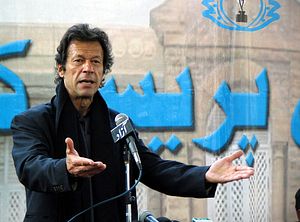The Panama Papers and the revelations therein have left an indelible mark on Pakistan’s political landscape. The bitterly polarized parties of the Pakistan Muslim League (N) and the Pakistan Tehreek-e-Insaaf (PTI) once again find themselves at loggerheads over what the latter views as the former’s unwavering corruption. Three of the prime minister’s own family members have been implicated in off-shore activities as per the leaks, which prompted Prime Minister Nawaz Sharif to set up a judicial commission to probe the matter. Apparently this move does not gain much ground for the PTI chief, Imran Khan, and for good reason.
The leaks have actually emboldened the PTI to the point where they are calling for a nationwide rally against their opponents in the town of Raiwind in Punjab, which is also the residence of the Sharif family, to protest against their offshore holdings. A rally will also take place in Islamabad, which recently witnessed clashes between the supporters of the assassin and now deceased Islamist Mumtaz Qadri and security forces after he was awarded a death sentence.
For Imran and his party, however, this march is about a corruption free, transparent and prosperous Pakistan which lives up to the ideals of the founding father of the nation, Quaid-e-Azam. For those who question his motivations, his rallying cries for accountability and restoring the nation’s wealth brings about vague flashbacks of the PTI’s earlier protests over the election results in 2013, which according to them was marred with rigging and tinkering. The protests back then fizzled out and so did Imran, but now he is suddenly back in the limelight thanks to the Panama Papers.
The impact of Panama revelations in Pakistan will be different than other countries, including Iceland. To expect the resignation of the prime minister in Pakistan would be like expecting a grey hound to win the London Derby. What the revelations could result in, however, is the reinvigoration of Imran Khan’s political career and the ensuing debate over the leaks, where such cases are often viewed as conspiracy theories.
Yet little can detract from the fact that Pakistan as a country is beset by corruption and the political elite remain unaccountable. Strengthening accountability is a worthy cause to rally for. The PML-N’s pro-developmental agenda, which ensured that they secured a popular majority during the 2013 elections, is being clouded by media revelations of how members of the Sharif family themselves amassed considerable wealth from offshore companies. With such evidence out for public consumption, Imran Khan’s PTI has an ideal opportunity to level scores after its ill-fated attempt to overthrow the government, which resulted in considerable castigation of the PTI even among some of its devout supporters. Restoration of the nation’s wealth to the common citizenry gains more traction among the public compared to the resignation of the prime minister. Khan’s actions will no doubt polarize the debate regarding his opportunism. His decision to side with Dr. Tahir Ul Qadri, a Canadian cleric known for his inflammatory comments, eccentric demeanor, and unpredictable politics, is one such case of opportunism.
Yet the Panama papers come as a blessing in disguise for Imran Khan. The timing is significant too, given the government’s apparent failure to handle the Qadri crisis as well as its failure to live up to its economic agenda. The opportunity now allows the opposition to restore lost ground. For his detractors, Imran Khan is out to restore his chances at becoming a future prime minister of Pakistan. For his supporters, however, Imran’s cause was justified earlier and is justified now, with evidence supporting him. Either way, his march to Islamabad and Raiwind makes for fascinating viewing and could become a turning point for the PML-N.
Hamzah Rifaat is a 2016 Visiting Fellow at the Stimson Center and has worked as a freelancer for the Friday Times, a newsweekly based in Lahore, since November 2012.
































